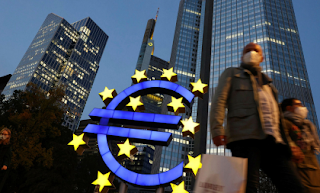The European Central Bank kept its vast stimulus for the eurozone in place last 22 July, signaling ongoing support was needed to reach its newly revised, higher inflation target.
The 25-member governing council decided at their meeting to hold interest rates at historic lows, including a negative bank deposit rate, the ECB said in a statement.
Governors also made no tweaks to their 1.85-trillion-euro (US$ 2.2 trillion) pandemic emergency bond-purchasing scheme (PEPP), which is the bank's main tool to help the region through the pandemic crisis.
The ECB's ultra-loose monetary policy measures are aimed at keeping credit cheap in the eurozone to spur lending and investment.
The 22 July meeting was the first since the ECB unveiled the results of an 18-month long strategic review of the bank's tools and goals - its first since 2003.
The biggest change to come out of it was a revised inflation goal of two percent, compared with an earlier target of "close to, but below two percent" that has been out of reach for years.
The new goal was reflected in the ECB's "forward guidance" statement, which details the latest monetary policy decisions and is closely scrutinized by markets for hints on future moves on rates and bond-buying.
The revamped statement pledged to keep interest rates at their current low levels until inflation is seen "durably" reaching the new two-percent target.
ECB President Christine Lagarde had promised earlier this month that the statement would be revamped to use clearer language.
Attention now shifts to Lagarde's 1230 GMT press conference in Frankfurt, where she will likely be quizzed on when the bank might start winding down the PEPP purchases.
Although some disagreement has emerged among ECB governors about when to start weaning the 19-nation currency club off the massive stimulus, observers say a recent rise in coronavirus cases is likely to delay discussion about tightening policies.
The "forward guidance" statement reiterated that PEPP will remain in place until at least March 2022, or until the ECB "judges that the coronavirus crisis phase is over".
A solid rebound is underway across the euro area, thanks to mass vaccinations and widespread reopenings.
But concern is growing about the rapid spread of the virus' Delta variant, which has fuelled a surge in new cases and forced several countries to reintroduce restrictions.

















0 comments
Post a Comment